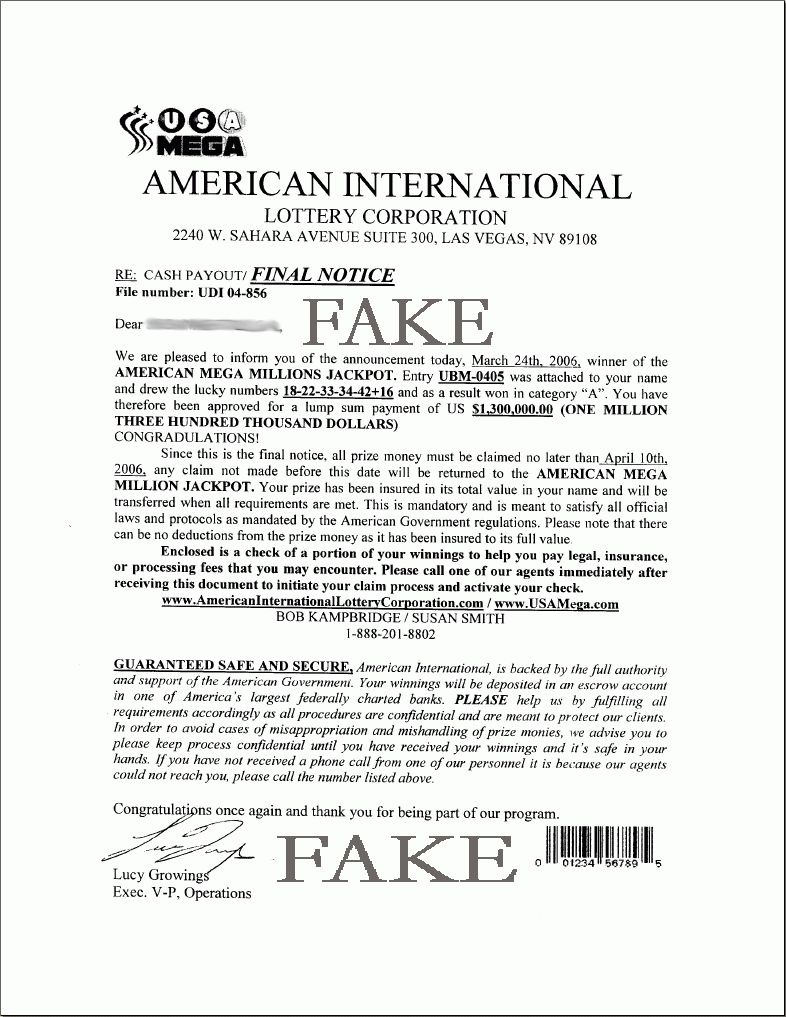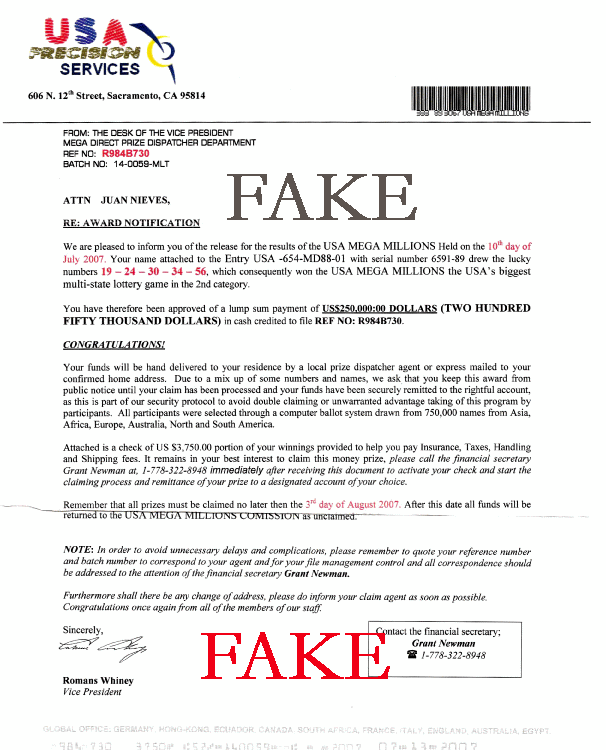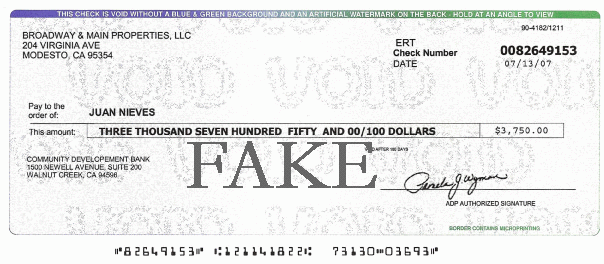
• Home •
Victim´s Story •
Fraud Prevention •
Project GSO •
Hall of Shame •
LINKS •

How to detect Lottery Scams
The most common Internet scams
"Congratulations!
You may receive a certified check for up to $400,000 U.S. CASH!
One Lump sum! Tax free! Your odds to WIN are 1-6."
"Hundreds of U.S. citizens win every week using our secret system!
You can win as much as you want!"
Sound great? It's a fraud.
Scam operators — often based in the Netherlands, Canada and Nigeria— are using the telephone and direct mail to entice U.S. (and other global) consumers to buy chances in high-stakes foreign lotteries from as far away as Australia and Europe. Even if there were legitimate, these lottery solicitations violate U.S. law, which prohibits the cross-border sale or purchase of lottery tickets by phone or mail.
Still, federal law enforcement authorities are intercepting and destroying millions of foreign lottery mailings sent or delivered by the truckload into the U.S. And consumers, lured by prospects of instant wealth, are responding to the solicitations that do get through-to the tune of $120 million a year, according to the U.S. Postal Inspection Service.
The Federal Trade Commission says most promotions for foreign lotteries are likely to be phony. Many scam operators don't even buy the promised lottery tickets. Others buy some tickets, but keep the "winnings" for themselves. In addition, lottery hustlers use victims' bank account numbers to make unauthorized withdrawals or their credit card numbers to run up additional charges.
The FTC has these words of caution for consumers who are thinking about responding to a foreign lottery:
• If you play a foreign lottery-through the mail or over the telephone-you're violating U.S. federal law, so don't expect any help from the government.
• There are no secret systems for winning foreign lotteries. Your chances of winning more than the cost of your tickets are slim to none.
• If you purchase one foreign lottery ticket, expect many more bogus offers for lottery or investment "opportunities." Your name will be placed on "sucker lists" that fraudulent telemarketers buy and sell.
• Keep your credit card and bank account numbers to yourself. Scam artists often ask for them during an unsolicited sales pitch.
• If you receive a letter saying you've won, when you haven't entered a lottery; it IS a fraud - count on it!
The bottom line, according to the FTC: Ignore all mail and phone solicitations for foreign lottery promotions. If you receive what looks like lottery material from a foreign country, give it to your local postmaster.
To report telemarketing fraud of any kind, contact your state Attorney General.
The FTC works for the consumer to prevent fraudulent, deceptive and unfair business practices in the marketplace and to provide information to help consumers spot, stop and avoid them. r to get free information on consumer issues, visit www.ftc.gov or call toll-free, 1-877-FTC-HELP (1-877-382-4357 ); TTY: 1-866-653-4261 . The FTC enters Internet, telemarketing, identity theft and other fraud-related complaints into Consumer Sentinel, a secure, online database available to hundreds of civil and criminal law enforcement agencies in the U.S. and abroad.
And for additional useful government websites:
• The Do Not Call list - Prevent telemarketers from calling you at dinnertime (or any other time!)
• Prevent Identity Theft!
• What to do about spam email
Steer Clear of Scams with these Tips
from the Texas Lottery Commission
With lottery scams of all types making headlines, the Texas Lottery Commission wants you to have the facts about these sure losers. While the information below may not cover every trick these con artists use, these are some common traps to avoid.
Spotting a Scam
- Scammers use a wide variety of tactics to dupe their victims, but you can usually spot these cons by noticing a few telltale signs.
- The winnings are for an international lottery or a contest that you did not enter.
- Rest assured that your chances of winning a drawing without entering are non-existent.
- You are asked to pay up-front in order to claim your winnings.
- Winners of a Texas Lottery® game are not required to pay in order to claim winnings. All taxes or other obligations owed are subtracted from the prize amount.
- The person insists that they are unable to claim the prize due to citizenship concerns.
- You do not need to be a United States citizen to claim a Texas Lottery prize.
- You receive communications from someone claiming to be affiliated with the Texas Lottery Commission telling you that you won.
Generally the Texas Lottery Commission does not contact winners because the agency has no way of knowing winners' identities until they come forward with their tickets. If you win a second-chance drawing, the agency will send the prize to you by mail. The agency will never, however, ask you to provide money or financial information in order to receive a prize.
An email offers to help you set up a lottery franchise.
These offers do not originate with the Texas Lottery Commission and may involve illegal activity. If you are interested in becoming a retailer, please click here .
Protecting Yourself
If all this talk of scams has got you down, cheer up! There are several steps you can take to keep cheaters from ruining your fun.
- Only buy tickets from authorized retailers.
- Don’t buy Texas Lottery tickets from anyone located outside the State of Texas .
- Never give out personal or financial information in response to a request you receive by mail, phone or email.
Never pay money to anyone to claim a prize or defray the “costs” involved in claiming a prize.
- Be wary of lottery pools. Only pool your money with those you trust and be sure that you understand exactly what your share in any winnings would be. It is recommended that you ask for all terms and conditions in writing before joining a lottery pool.
- Always sign your ticket so that no one else can claim your prize.
Do not purchase a “winning” ticket from a stranger. The ticket may be altered, fake or already claimed.
- Report the potential fraud or scam to the appropriate authorities.
- When in doubt, call 1-800-37LOTTO (1-800-375-6886 ). Lottery staff will be happy to answer your questions.
To learn more about the common Latin Lotto Scam, click here for The Truth Report including downloadable flyers in English and Spanish.
For additional information on international lottery scams and tips to avoid them, click here to visit the Federal Trade Commission’s Web page on cross-border fraud.
Lottery fake documents:
© by GSO • Contact


